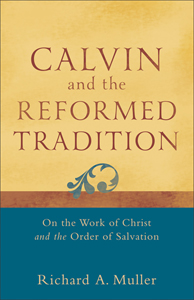
Richard A. Muller
Reviewed by: Samuel Rodriguez
Calvin and the Reformed Tradition, by Richard A. Muller. Published by Baker Academic, 2012. Paperback, 288 pages, list price $39.99. Reviewed by OP pastor Samuel Rodriguez.
Richard A. Muller, who teaches at Calvin Theological Seminary, has written an excellent collection of essays on historical Reformed theology.
The major premise of the book is that while John Calvin was a major second-generation codifier of Reformed theology, he was not the be-all and end-all of the tradition. Rather, the Reformed tradition was diverse and more complex than just one of its contributors. Chapter 1 introduces the context of the study as a whole, situating it from the beginning of the Reformation (1517) to the early Orthodox era (1640). He cogently demonstrates that the history of the Reformed tradition should be given nuanced, contextual study.
Chapter 2 is provocatively entitled "Was Calvin a Calvinist?" He examines three options for answering this question. First, yes of course Calvin was a Calvinist, since he was John Calvin. In this view, he was the defining Calvinist. The second option is that he was not his own follower, so no he was not a Calvinist. Calvinism was not an appellation that theologians in the Reformed tradition accepted in the early Orthodox era. The third option is to identify Calvinism with the Reformed tradition. But the answer here is more complex, because it presents Calvin as having an exclusive place in the greater Reformed tradition that he did not have. Muller then deals with the so-called five points of Calvinism or TULIP. Explaining that TULIP is an Anglo-American creation of recent vintage, it cannot and ought not be used to define the greater Reformed tradition. Muller, who has made a career out of debunking "Calvin against the Calvinists" scholarship, also debunks theories that identify such things as "Christocentrism" and "Predestinarianism" as the central Reformed dogmas. He also shows that the dichotomy between humanism and Scholasticism is dubious. Thus, the terms Calvinist and TULIP are anachronistic and reductionistic when applied to the Reformed tradition of the sixteenth and seventeenth centuries.
Chapters 3 to 5 deal with Christ's death and its sufficiency and efficacy. There were several orthodox options in the period dealt with in this book. Page 77 and footnote 22 outline at least seven distinct formulations of this doctrine among the early modern Reformed. Chapter 4 demonstrates that Calvin did not teach two wills in God, contrary to Moise Amyraut. Chapter 5 contrasts two Reformed theologians who were hypothetical universalists. It should be noted that Calvin and all the Reformed believed that Christ's death was efficient for the elect alone (see p. 61, n. 21). Chapter 6 explains how the theological concept later termed the ordo salutis originated in the Reformed tradition. Chapter 7 clearly demonstrates that union with Christ and the ordo salutis were held as complementary doctrines, not rivals. Chapter 8 argues that the practical syllogism was of Reformation origin.
This is an excellent book. It is well documented with 1,005 footnotes. There are some typographical errors (of no consequence), and the book would have been well served by at least a select bibliography. For those interested in historical Reformed theology, it is a must read.
November 16, 2025
November 09, 2025
November 02, 2025
October 26, 2025
October 19, 2025
October 05, 2025
Raising Sexually Faithful Kids and
Parenting Boys and Girls in a Gender-Confused World
September 28, 2025
© 2025 The Orthodox Presbyterian Church